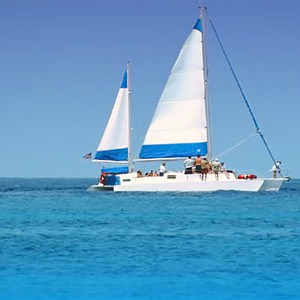Please Register / Login to take part in discussions about the Virgin Islands.
*what year was slavery started in St. Croix and when did it end?
The Danish West India Company settled St. Croix in 1735 and offered tax exemptions and subsidies to attract planters.
In 1742 there were 1,906 slaves on St. Croix. By 1835 that number had expanded to 19,876 slaves.
In 1848 a man by the name of Moses "Buddhoe" Gottlieb organized a revolution and threatened to burn down the fort in Fredricksted if they weren't granted freedom. The slaves were granted emancipation on September 22, 1848.
The holiday that celebrates emanicipation of slavery in the USVI (formerly the Danish West Indies) is July 3rd ( 1848 ).
Incidently, folks on St. Croix, FEDA is hosting various reinactments, masses and fairs for the week of Emanicipation Day.
--Islander
Right you are Islander. I culled the information I provided from a book I own titled "A Brief History of the Caribbean - From the Arawak and Carib to the Present" by Jan Rogozinski.
I assumed that although Scholten declared slaves free on July 3rd, 1848, it didn't become official until Sept. 22. A serch of the internet doesn't bear this out. Although I did find a little blurb that states that the slaves were to retain possession of their dwellings for a period of 3 months from the date of the emancipation.
Richard
Hello Richard,
I thought the same as you when I read the dates you stated, that perhaps it was not officially accepted by Denmark until Sept. however I don' recall ever reading such - I just scanned through a few books I have about Slavery in the Danish West Indies and didn't find anything, will keep an eye out when reading other historical accounts.
--Islander
We should all know the history and dates, but! Slavery began long before that I believe. The revolt on St. John took place in 1733. The Danes started bringing in slaves in the early 1730s I read. Wonder if they were just using indentured servants before that, as they settled in St. Thomas in 1666?
There were plans to abolish slavery by the 1850s but the revolt in July 1848, led by General Bordeaux(Buddhoe) and Queen Mary caused Governor Peter Von Sholten to declare 'You are now free, you can go home" On July 3, 1848.
Ronnie
Well now you got me started. I see the question was about St. Croix. Still reading. Seems earlier than 1730s. In 1732 the Moravians set up a mission to help convert the slaves from their heathenistic ways in St. Thomas, it continued in ST. Croix and ST. John.
When the Danish West India and Guinea Company established themselves in 1671 in St. Thomas, they were starting up the cultivating of the islands and realized they needed slaves. They set out 8 years later to import them.
When they took over St. Croix in 1735, it had been left abandoned by the French in the late 1600s. Who is to say the French had no slaves? Have to do more research! Had this class in HS. Can't remember much!
Ronnie
The Danish government signed a treaty with the Dutch of Brandenburg in or around 1685 allowing the Brandenburg American Company to establish a slave-trading post on St. Thomas, so it would seem that if it was established around 1685 on St. Thomas that as soon as the Danes took up settling St. Croix they would have brought slaves with them; but quite right who is to say the French didn't have slaves or the Dutch and English before the French?
The plans to abolish slavery as far as I understand was a 12 year plan; this was set up in 1847... the plan stipulated that kids born after such and such date would be free and freedom would be gradual.
I read one version that mentioned Buddhoe not being the master mind of the slave revolt and noted he was friends with Gov. Scholten. Another version mentioned a suspicion that Scholten knew of the revolt plans via Buddhoe but that Buddhoe in interrogations never named Scholten as being involved. I also read that Buddhoe managed the mob of rioters as a leader and tried to persuade them not to burn plantations or harm whites, just to stand together and protest.
Wasn't Queen Mary a leader in the labor riots after emancipation?
--Islander
Ronnie: I am thinking of auditing the "History of the VI" taught by Malik Sekou at UVI in the fall...wanna join me???
According to the book I referenced earlier, separate parties of British and Dutch planters occupied St. Croix in 1625. The Dutch, governed by the West India Company, occupied the harbor at Christiansted, while the British took the southwestern shore, near Fredricksted. By 1645, the British settlers had driven out the Dutch. However the Spanish authorities, not welcoming such a large British colony so close to Puerto Rico, expelled the British in 1650. After that the French governor of St. Kitts sent soldiers to expel the Spanish and he bought St. Croix for the Knights of Malta in 1651. Large sums of money was spent on St. Croix to cultivate sugar but the island proved unhealthy and droughts burned up the cane fields. So in 1696 the French evacuated St. Croix and finally gave up their claim to the island in 1713.
Typically when one thinks of slaves we think of African slaves. However according to this website ( http://www.kavanaghfamily.com/articles/2003/20030618jfc.htm) during the 17th century the English were capturing political prisoners during a period when they were trying to exterminate the Irish. They began selling the Irish as slaves to colonies in the Caribbean. There are records of Irish sold as slaves in 1664 to the French on St. Bartholomew. Few people today realize that from 1600 to 1699, far more Irish were sold as slaves than Africans.
So given that sugar cane, which requires a fair amount of laborers, was grown on St. Croix during this period, it's likely that a least some of the workers were slaves. Now, whether they were African or Irish, or a mixture of both, would be interesting to know.
Richard
Pretty much was my point Richard. They used the term indentured servitude for the Irish and whomever else they dragged in I believe. Maybe I will take East Ender up on auditing the course in the Fall!
Ronnie
I wonder how far the names Farrelly and Mulloy go back in St. Croix's history?
Richard



